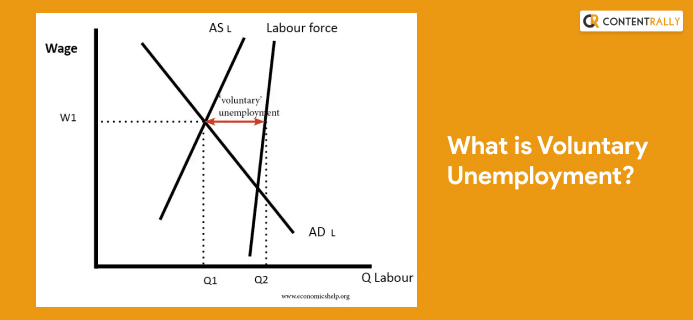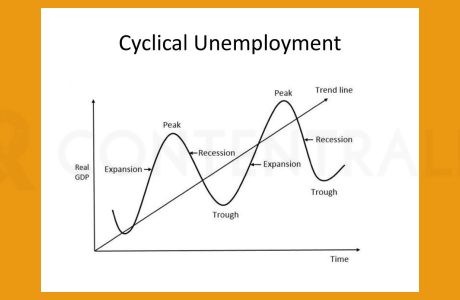Voluntary unemployment is a circumstance where the unemployed individual decides not to consider the job at the going wage rate. This can be due to various reasons that we will discuss in this article.
This type of unemployment refers to voluntary non-working. Examples of this unemployment are people who refuse certain job offers because their benefits are not in line with expectations.
On the other hand, voluntary unemployment contrasts with involuntary unemployment, which includes people who are prepared to work but are jobless.
What Is Voluntary Unemployment? How Is It Different From Involuntary Unemployment?

Voluntary unemployment describes the number of individuals in an economy without jobs because they choose to be unemployed. The primary reasons can be an incompatibility with open positions or low wages.
On the other hand, involuntary unemployment means there are no types of job openings that fit your expertise. Or, you may not have the right qualifications that fulfill the employer’s expectations.
So, I believe that both topics should not be overemphasized. In fact, most of the workers even have a chance of being employed at a certain wage level.
Reasons For Voluntary Unemployment
There can be specific reasons for voluntary unemployment and these are described below.
i). Certain jobs are very boring, such as security guard, fruit picking, etc.
ii). There are many individuals who are looking for a job as per their skills and qualifications. However, it is very difficult to find nowadays.
iii). There are many unemployed benefits a person receives from the government when he/she has no way to feed their family.
iv). High marginal tax rates also prevent people from looking for work. These tax rates minimize the salary they bring home.
v). Most people think that they are financially prosperous with unemployment benefits rather than considering low wages.
Voluntary Unemployment Relationship With Other Forms Of Unemployment
Voluntary Unemployment is politically sensitive because it highlights that the unemployed are lazy and not willing to work due to low wages. It can also cause poverty in the long run if it is used as a reason for cutting unemployment advantages.
So, there is a strong relationship between voluntary unemployment with other forms of unemployment.
1. Involuntary Unemployment
Involuntary unemployment occurs when those who are able and ready to work at the going wage rate but are limited by factors beyond their control.
These factors can be efficiency wage theory, implicit wage bargaining, labor market inflexibilities, and deficiency of aggregate demand.
2. Demand Deficient Unemployment
Demand Deficient Unemployment occurs when a fall in economic growth leads to less demand for labor. A fall in aggregate demand means that fewer goods and services are in demand, and less labor is needed.
For example, the demand deficient unemployment graph had increased during the Covid-19 pandemic. At the same time, the unemployment rate had also increased.
3. Structural Unemployment
Structural unemployment is caused by a mismatch of skills between the available jobs and the unemployed. This is usually caused by changes in the economy.
For example, skilled pilots would lose their jobs if airplanes became completely automated. Then, these pilots may struggle to start again in the new industry.
4. Frictional Unemployment
Frictional unemployment is when employees decide to leave their current positions in order to find new ones and individuals entering the workforce for the very first time.
Besides, this unemployment type has a very close relationship with voluntary unemployment, and it occurs naturally.
Frequently Asked Questions (FAQs)
1. What Are The Six Types Of Unemployment?
Ans: The six most common types of unemployment are Frictional unemployment, Institutional unemployment, Structural unemployment, Cyclical unemployment, Disguised unemployment, and Technological unemployment.
2. What Are The Examples Of Voluntary Unemployment?
Ans: Voluntary unemployment refers to deciding not to be employed despite the availability of work. The best example of voluntary unemployment is quitting one’s job, and there can be various reasons for the same.
3. Is Voluntary Unemployment Not Considered As Unemployed?
Ans: Voluntary unemployment is the situation where a person is able to work but denies to work due to many reasons. They are known as unemployed of their own will. Thus, they are not considered unemployed and will not be given any benefits by the government.
4. What Is The Difference Between Voluntary And Involuntary Unemployment?
Ans: Voluntary unemployment is the situation where a person is able to work but denies to work due to many reasons. At the same time, involuntary unemployment occurs when a person is unemployed, notwithstanding being ready to work at the current wage.
The Final Thoughts
Voluntary unemployment is rising at present, and there are many reasons for the same. For example, a person looking for a job and not getting the desired job according to his skills and qualifications may reject the job opportunity. Thus, this is all about voluntary unemployment and how it affects your day-to-day life.
Read Also:
























